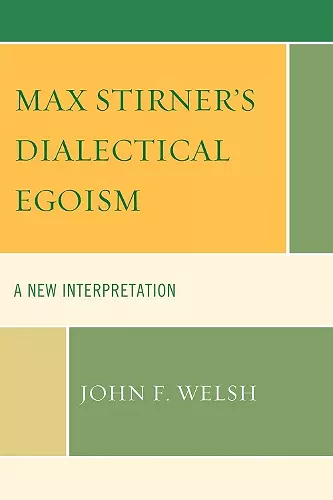Max Stirner's Dialectical Egoism
A New Interpretation
Format:Paperback
Publisher:Lexington Books
Published:23rd Sep '10
Currently unavailable, and unfortunately no date known when it will be back
This paperback is available in another edition too:
- Hardback£109.00(9780739141557)

Max Stirner (1806-1856) is recognized in the history of political thought because of his egoist classic The Ego and Its Own. Stirner was a student of Hegel, and a critic of the Young Hegelians and the emerging forms of socialist and communist thought in the 1840s. Max Stirner's Dialectical Egoism: A New Interpretation examines Stirner's thought as a critique of modernity, by which he meant the domination of culture and politics by humanist ideology. In Stirner's view, 'humanity' is the supreme being of modernity and 'humanism' is the prevailing legitimation of social and political domination. Welsh traces Stirner's thought from his early essays to The Ego and Its Own and Stirner's responses to his critics. He also examines how Benjamin Tucker, James L. Walker, and Dora Marsden applied Stirner's dialectical egoism to the analysis of (a) the transformations of capitalism, (b) culture, ethics, and mass psychology, and (c) feminism, socialism, and communism. All three viewed Stirner as a champion of individuality against the collectivizing and homogenizing forces of the modern world. Welsh also takes great care to dissociate Stirner's thought from that of the other great egoist critic of modernity, Friedrich Nietzsche. He argues that the similarities in the dissidence of Stirner and Nietzsche are superficial. The book concludes with an interpretation of Stirner's thought as a form of dialectical egoism that includes (a) a multi-tiered analysis of culture, society, and individuality; (b) the basic principles of Stirner's view of the relationship between individuals and social organization; and (c) the forms of critique he employs. Stirner's critique of modernity is a significant contribution to the growing literature on libertarianism, dialectical analysis, and post-modernism.
John F. Welsh provides us with a superb distillation of the thought of Max Stirner and the dialectical-egoist paradigm he developed. Through this brilliant study, Welsh demonstrates the power and breadth of dialectics as a radical mode of analysis and social transformation. -- Chris Matthew Sciabarra, New York University
A book of this kind has been long awaited. It is the first modern book-length sympathetic, yet balanced and scholarly, exposition of Max Stirner's thought and, in my opinion, the best book on Max Stirner on the market. John Welsh's Max Stirner's Dialectic Egoism contains new and useful arguments based on sound scholarship. Welsh shows a good grasp of what Stirner means and what he doesn't, and of the different interpretations of him up until the present. The text includes different interpretations and understandings of Stirner, an exegesis of Stirner's major work, The Ego and Its Own, insights of leading historians of philosophy, and a comparison of Stirner and his disciples. Overall, well researched and very informative! -- Svein Olav Nyberg, Agder University College
Welsh is clearly aware of these central aspects of Stirner's project….He has…offered a very useful tool for anarchists, egoists and Stirner scholars, a tool that is well worth using. And it is not difficult to use. The language is fairly simple and straightforward. The content is well organized. I recommend the book for anyone interested in exploring what Stirner has to offer us in our confrontations with the ruling institutions. * Modern Slavery *
Any reader of this journal, and anyone who has ever tried to grapple with Stirner, will enjoy and benefit from this book. Scholars and students seeking a clear, honest, up-to-date introduction to Stirner need look no further. Individual-minded individuals outside the academy will also find this book of use. * I-Studies *
ISBN: 9780739141564
Dimensions: 232mm x 157mm x 19mm
Weight: 467g
304 pages